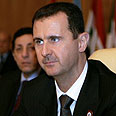
'Mighty grip.' Syria's Bashar Assad
צילום: AFP
Report: Syria tightens control on media, Internet
225 Internet sites blocked last year, including several Arab newspapers and portals, Amazon, Facebook and YouTube, author of report on censorship in Syria says, adding 'internal and external conditions combined to make it easier to violate individual rights'
Syrian authorities have tightened their "mighty grip" on the media and Internet since ties improved with the West last year, the author of a new report on censorship in the Arab country said on Sunday.
"With Syria breaking free from its isolation, the need is greater than ever to ease the mighty censorship and grip over the media, which have only contributed to spreading ignorance and corruption," Mazen Darwich, head of the Syrian Media Center, told Reuters.
"Last year, however, was worse than the previous one. Internal and external conditions combined to make it easier to violate individual rights, which reflected on freedom of press and expression," he added.
Western nations have intensified contacts with Damascus, after several years of strained ties, and backed efforts to reach a peace deal between Syria and Israel.
The United States and most European countries have also toned down their criticism of Syria's human rights record and curbs on freedom of expression, which the government says are necessary considering a technical state of war with Israel.
'No structural change'
The report, entitled "Syrian pens fall silent", said 225 Internet sites were blocked last year, up from 159 in 2007. The sites include several Arab newspapers and portals, Amazon, Facebook and YouTube.
Twenty one percent of the sites banned were Kurdish -- Syria has around one million Kurds, including tens of thousands without citizenship -- and 15 percent are run by Syrian opposition groups.
Bans on a few sites, such as the Arabic language Wikipedia, were lifted, but the Internet remains under the monitoring of the security apparatus, Darwich said.
"We are a long way away from a free cyberspace, but at least supervision should be in the hands of the government, not security, and subject to a law," he said.
The authorities also shut down eight publications last year and licensing remains difficult, the report said. A state agency holds a monopoly on advertising.
"We have seen some improvements on the margins, such as the possibility of lifting travel bans on some journalists, but there is no structural change," said Darwich, whose centre is one of a few private organizations dealing with human rights allowed to operate in Syria.
One Syrian blogger has been waiting to stand trial on charges of "weakening national feelings" since June 2008, and an activist was jailed for six months after criticizing the government's policies on culture, the report said.










